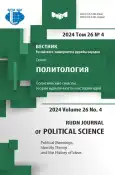Identity and Socio-Political Self-Determination of the Ewe People in Ghana and Togo
- Authors: Medushevskii N.A.1,2
-
Affiliations:
- Russian State University for the Humanities
- RUDN University
- Issue: Vol 26, No 4 (2024): Political Meanings, Identity Theory and the History of Ideas
- Pages: 753-767
- Section: IDENTITY AND SOCIO-POLITICAL DIVISIONS
- URL: https://journal-vniispk.ru/2313-1438/article/view/322406
- DOI: https://doi.org/10.22363/2313-1438-2024-26-4-753-767
- EDN: https://elibrary.ru/XIHRDJ
- ID: 322406
Cite item
Full Text
Abstract
The issue of Ewes political identity is extremely relevant for the countries of their residence, since both countries have a diverse ethnic composition of the population and autonomy, or the separation of a large ethnic group can destabilize the political situation, push other ethnic groups to self-determination, and, in general, raise the question of the legitimacy of postcolonial state borders, which is relevant for most countries of West Africa. In this regard, the purpose of the study is to analyze the process of Ewe political selfidentification formation after the countries gained independence and to state the modern image of identity based on self-identification studies. The modern image of identity of the Ewe in Ghana and Togo is analyzed based on a sociological study by D. Zormelo in 2020 and a similar study by the author of this article in 2024. The study is based on a constructivist approach using retrospective and historical-systemic methods. In the context of the study, the author states that the problem of the Ewe ethnic identity formation has historical roots, since the Ewe, despite having a common language and cultural tradition, have always been disunited and are still characterized by a clan-tribal structure of self-government, which exists in parallel with the state vertical of power. At the same time, the independence of Ghana and Togo in the 1950s involved the Ewe in a competitive struggle with other ethnic communities claiming state power and resources. In the 1970s, the confrontation was in an acute phase, but in recent decades it has passed into a latent phase. As showed a sociological survey conducted in the two countries, the Ewe certainly recognize the presence of their cultural and linguistic identity, but there is no commonality of political goals today, although ethnic identity is an effective tool for political speculation on the topic of regional stability.
Keywords
About the authors
Nikolay A. Medushevskii
Russian State University for the Humanities; RUDN University
Author for correspondence.
Email: lucky5659@yandex.ru
ORCID iD: 0000-0003-0475-6713
Doctor of Political Sciences, Professor of the Department of Modern East and Africa of the Faculty of Oriental Studies and Social and Communicative Sciences, Russian State University for the Humanities, Associate Professor, RUDN Universiry
Moscow, Russian FederationReferences
- Mazov, S.V. (2010). «Tsarstvo» of Kvame Nkruma. Vostok (Oriens), 1, 62–70. (In Russian).
- Pilnikov, B. (1996). Prezident of Ghana Jerry Rolings. Asia and Africa Today, 11, 22–24. (In Russian).
- Gnassingbé, Eyadema. (1990). Who is who in world politics. L.P. Kravchenko (Ed.). Moscow: Politizdat. (In Russian).
- Amenumey, D.E.K. (1975). The general elections in the ‘Autonomous Republic of Togo’, April 1958: Background and interpretation. Transactions of the Historical Society of Ghana. 16(1) 48, 431–460.
- Akyeampong, E.K. (2001). Between the sea & the lagoon: An eco-social history of the Anlo of southeastern Ghana since 1850 to Recent Times. Oxford: James Currey — Athens/oh: Ohio University Press.
- Brown, D. (1980). Borderline politics in Ghana: The National Liberation Movement of Western Togoland. The Journal of Modern African Studies, 18(4), 609.
- Brown, D. (1982). Who are the tribalists? Social pluralism and political ideology in Ghana. African Affairs, 81(50), 37–69.
- Chazan, N. (1983). An anatomy of Ghanaian politics. Managing political recession, 1969–1982. Boulder, Colo.
- Chazan, N. (1982). Ethnicity and politics in Ghana. Political Science Quarterly, 97(3), 474–484.
- Duodu, C. (1974). Succession in Ghana. Africa, 34, 14–15.
- Hutchful, Е. (1997). Reconstructing civil military relations and the collapse of democracy in Ghana 1979–81. African Affairs, 96, 535–550.
- Lawrance, B.N. (2000). Most obedient servants: The politics of language in German colonial Togo. Cahiers d’Études Africaines, 40(159), 490–514.
- McLaughlin, J.L., & Owusu-Ansah, D. (1995). Introduction (and sub-chapter). In L. Berry (Ed.), A country study: Ghana (pp. 1–53). 3rd ed. Washington DC: Library of Congress Federal Research Division.
- Mapp, R.E. (1972). Cross-national dimensions of ethnocentrism. Canadian Journal of African Studies, 6(1), 73-96.
- Rothchild, D., & Gyimah-Boadi, E. (1998). Populism in Ghana and Burkina Faso. Current History, 88, 221–241.
- Tishkov, V.A. (2003). Requiem for Ethnos. Moscow: Nauka Publ. (In Russian)
Supplementary files









